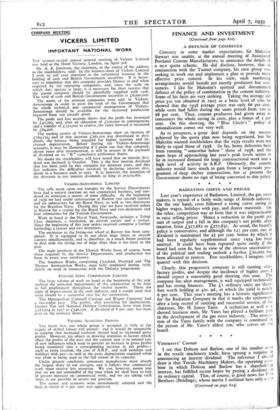RADIATION COSTS AND PRICES
Last year's experience of Radiation, Limited, the gas stove makers, is typical of a fairly wide range of British industry. On the one hand, costs followed a rising curve owing to higher wages, holidays with pay, and dearer materials. On the other, competition was so keen that it was impracticable to raise selling prices. Hence a reduction in the profit per unit of output and a fall in this company's net profit, after taxation, from £327,682 to £277,831. As usual, the board's policy is conservative, and although the 121 per cent. rate of dividend is maintained the 21 per cent. bonus by which it had been regularly supplemented since 1934 has been omitted. It could have been repeated quite easily if the board had seen fit, but in view of the obvious uncertainties of the political and trading outlook a further £20,000 has been allocated to reserve. Few stockholders, I imagine, will quarrel with this decision.
Clearly, this progressive company is still earning satis- factory profits, and despite the incidence of higher costs I should expect a reasonably good showing this year. The company has alert management, is well equipped technically and has strong finances. The LI ordinary units are there- fore worth holding at 42s. 9d., at which the yield is nearly 6 per cent. This year's meeting has a historic significance for the Radiation Company in that it marks the retirement, after a long record of untiring and successful service, of the chairman, Mr. H. James Yates. A technician as well as a shrewd business man, Mr. Yates has played a brilliant part in the development of the gas stove industry. The associa- tion of the Yates family with the company is continued in the person of Mr. Yates's eldest son, who serves on the board.
* * * *










































 Previous page
Previous page